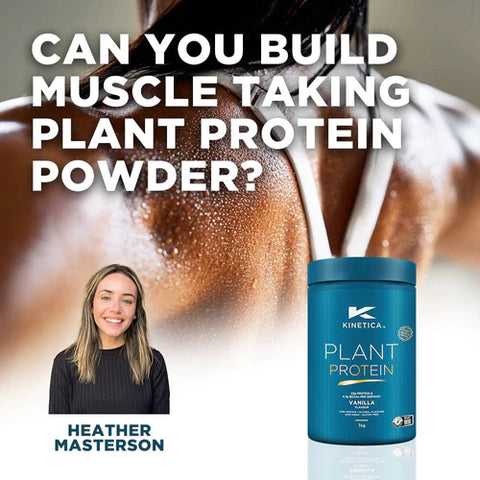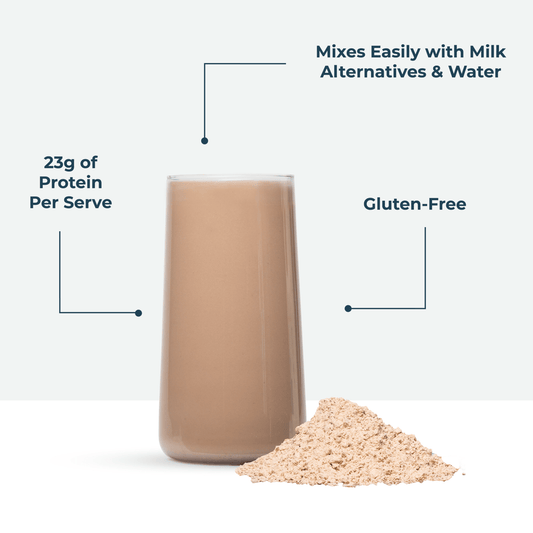Can you Build Muscle Taking Plant Protein?

There’s a lot of talk about whether you can build muscle with plant-based protein sources. Read our article for more information, or check out our recap for the highlights…
- Yes, you can build muscle with plant-based protein: building muscle on a plant-based or vegan diet is completely possible.
- Complete protein where possible: getting the right amino acids with key, and complete protein sources are a more convenient way to do this. The best plant-based protein powders have a blend of ingredients to make sure you’re getting the nutrients you need.
- Focus on overall diet: it’s not just plant protein powders that will help. Muscle growth depends not only on protein intake, but also on getting sufficient calories and other vital nutrients. A balanced diet is crucial.
- Learn about plant-based protein sources: alongside plant protein powder, we explore some of the key vegan or plant-based protein sources you should consider including in your diet.
In recent years, plant-based diets – like veganism or vegetarianism – have received a lot of attention. This is largely centred around questions of protein intake, and whether or not plant sources are sufficient to support our health, nutritional requirements, and body composition goals.
This has become even more of a debate for people interested in fitness. From professional athletes, to weekend warriors hitting the gym, the question of whether the vegan diet is suitable for muscle gain has been greatly examined.
To help cut through the noise, the team at Kinetica Sports have created this no-nonsense guide to give you the information you need to make an informed choice about your training and dietary plans. Keep reading to learn more…
An introduction to building muscle
When it comes to nutrition, there is a hierarchy of needs in order to support our health and performance. Protein is a foundational part of this hierarchy, as it is an essential component of any diet – particularly when muscle building is the goal. Proteins, and their constituent parts called amino acids, are involved in almost every biological process in the body; and are the primary macronutrient that supports growth and repair.
But what do we mean when we talk about muscle gain and growth?
Building muscle (aka hypertrophy) is the development of mass, density, shape and function within your muscle cells – the muscular myofibrillar and sarcoplasm glycogen stores to be exact1. For this to happen, the correct exercise stimulus (consistent, progressive resistance training) and nutrition strategy is required.
Putting it simply, to build muscle you need to choose the right exercise strategy and nutritional balance to see results.
And, one of the most important components of a nutrition strategy for building muscle is protein intake. Research suggests that the recommended intake of around 1.6-2g of protein per kilogram of body weight per day can support muscle gain2. However, it’s important to note that this can (and will) vary from person to person due to their bodily composition, performance goals, sex, and any existing conditions.
With this in mind, let’s look at plant proteins to find out more about optimising the vegan diet for muscle gain…

An introduction to plant protein sources
As we’ve already mentioned, protein is one of three vital macronutrients that your body needs to function (the others being carbohydrates and fats). But where do you get these nutrients? The answer – your diet.
The most common sources of protein are animal-based – red meat, fish, poultry, milk, eggs, and cheese to name a few. However, if you follow a plant-based diet, you will naturally need to derive your protein from elsewhere. Some excellent plant sources of protein include:
- Legumes, like beans and lentils.
- Grains and pseudograins, like quinoa.
- Meat substitutes, like tempeh, tofu, and seitan.
- Nuts and seeds.
These sources are also usually nutritionally rich with carbs, fats, vitamins and minerals, so it’s a good idea to have a variety in your diet.
But, when it comes to vegan muscle building, you might want to consider adding in a supplement to support your increased protein requirements. This is because it can be tricky to hit your training requirements solely from the food you eat.
Note: this is no different to people choosing to add whey protein powders to their diet to make it easier to achieve their own protein requirements.
Most plant-based protein powders will use a combination of sources, including peas, rice, soy or hemp. Our Plant Protein for example, combines micronised pea protein and rice protein for better absorption and utilisation by the body (more on this below).
And, if you want to learn more about plant proteins in general, check out our guide to What is Plant Protein Powder?
Are plant proteins good for muscle building?
With the above in mind, let’s move onto the bulk of the subject – is plant protein a useful part of the vegan diet for muscle gain?
The short answer? Yes, of course. Plant proteins are an excellent option for vegan muscle building, or even for those who have a sensitivity to lactose, as they’re not animal- or milk-based.
Rather than whether it’s animal or plant-based, when it comes to muscle gain, the most important aspects of a protein powder is the nutritional content and quality. So, let's look at these two topics in a bit more detail to fully explore how to find the best vegan protein powders for muscle gain…
Nutritional content
As with any dietary supplement, nutritional content is key. In terms of protein powders, vegan or otherwise, the first thing you need to look at is the actual amount of protein per serving.
Research suggests that the RDA of protein for physically active individuals sits between 1.2g-2g per kilo of body weight3. So, if you weigh 75kg, you would need around 112g of protein per day to support your training load (if we use 1.5g as an average RDA). A high-quality plant-based protein supplement will be able to supplement and support your regular diet to help you achieve this.
Take our very own Plant Protein. Delivering a powerful 23g of protein per serving, this takes the pressure off reaching your recommended protein requirement through meals alone, allowing you to focus on putting your all into your training.
Buy Now – Plant Protein (Vanilla) 1kg
The next thing you should look at is the nutritional profile of your chosen plant-based protein powder. In particular, the amount of leucine it contains.
Leucine is one of the most important amino acids when it comes to building muscle. This is because it’s required to stimulate muscle protein synthesis (the process in which the body uses amino acids to trigger muscle growth). According to research, while the exact mechanisms of action remain unclear, ‘increasing dietary leucine may be an effective strategy for promoting growth and development and maintaining overall health’4.
Our Plant Protein for example, contains 2.33g of leucine to support your vegan muscle building goals…
Ingredient quality and composition
When you’re looking for the best vegan protein powders for muscle gain (or indeed other dietary supplements to support your training), quality and ingredient composition is key. You want to ensure that not only are your supplements designed to support your goals, but that they have the best ingredients to do this.
When it comes to vegan muscle building, you need to look out for plant proteins that have a well-rounded ingredient composition. While animal-based sources, like whey, are ‘complete’ proteins (as they have all nine essential amino acids), this can be harder to do with plant proteins.
Buy Now – Plant Protein (Chocolate) 1kg
However, the best options will use a combination of sources to fulfil your protein needs. At Kinetica Sports for example, we refused to compromise on nutritional quality – which is why our award-winning Plant Protein Powders are made with a blend of micronised pea and rice protein. This ensures you’re getting the right amino acids to support your plant-based or vegan muscle building ambitions.
Is plant protein better than whey?
As with many things, using a direct value composition to answer whether plant protein is better than whey wouldn’t be the right thing to do. In fact, the best vegan protein powders for muscle gain have similar, if not the same, protein per serving stats as whey-based supplements. Instead, you need to look at this from a personal perspective, and make judgements depending on factors like:
- Allergies and dietary sensitivities.
- Lifestyle choices.
- Training goals.
To learn more about this subject, check out our guide to Is Plant Protein Powder Better Than Whey Protein Powder?
So, are plant proteins an option for vegan muscle building?
Absolutely! High-quality plant proteins are an excellent accompaniment to the vegan diet for muscle gain. You just need to know what to look for…
At Kinetica Sports, we never include ‘filler’ ingredients in our products: everything is included for a purpose. And, we think that our Plant Protein Powders certainly tick all the boxes when it comes to maximising the vegan diet for muscle gain.
Containing 23g of protein and over 2g of Leucine per 30g serving, not only will our plant proteins support your nutritional requirements, but they come in two amazing flavours: vanilla and chocolate. And, with our focus on quality, we didn’t rest until our Plant Protein Powders could proudly stand shoulder to shoulder with our Whey Products, so you can make the best choices for your training and personal lifestyle.
Choose Kinetica Sports Plant Protein Powder today!
Quality and safety aren’t just ideas at Kinetica Sports – they’re principles we live by. That’s why all of our products undergo rigorous testing to comply with the strict standards set by WADA (World Anti-Doping Agency) and Informed Sport.
So, it’s no surprise that our Plant Protein was a European Specialist Sports Nutrition Awards 2024 Award Winning Protein! Explore our Plant Protein range today, and don’t forget to check out some of our other amazing products, including our Hydration Drinks and Zinc Mag+.
And, for more advice, information, and buying guides, check out the Kinetica Sports blog…
What Are Energy Gels and How Can They Help You? | Busting Collagen Myths: The Truth About Collagen | The 4 R's of Recovery







